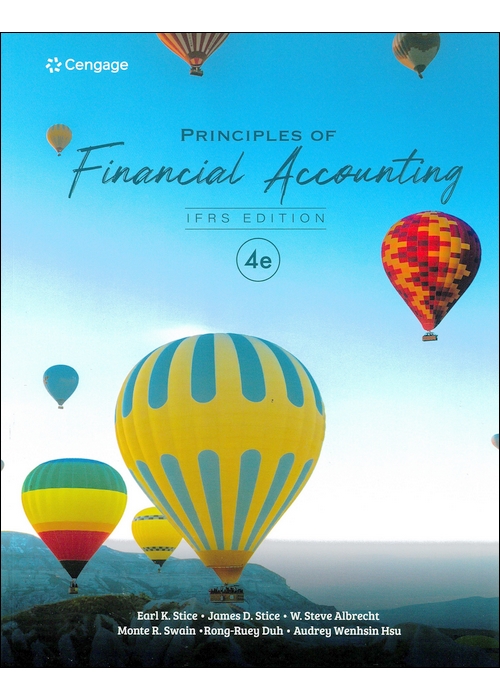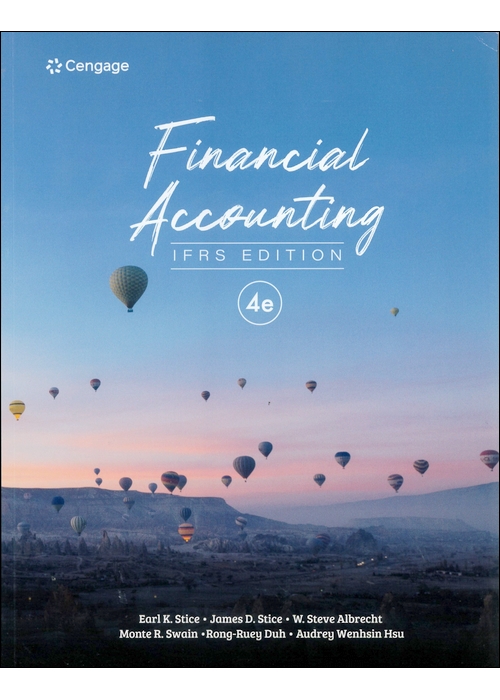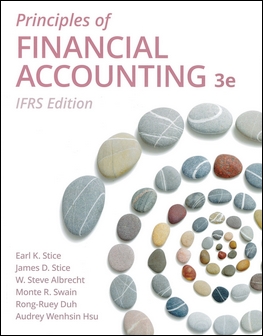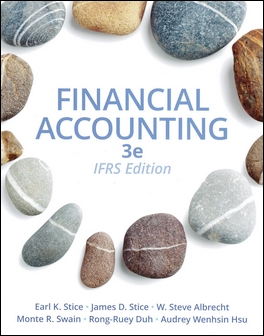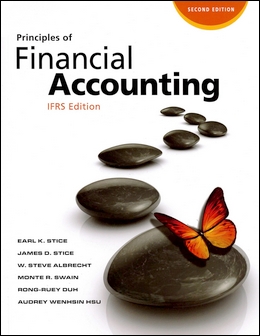Principles of Financial Accounting 4/e IFRS Edition
售價
$
1,450
- 一般書籍
- ISBN:9789815291483
- 作者:Earl K. Stice, James D. Stice, W. Steve Albrecht, Monte R. Swain, Rong-Ruey Duh, Audrey Wenhsin Hsu
- 版次:4
- 年份:2025
- 出版商:Cengage Learning
- 頁數/規格:792頁/平裝彩色
書籍介紹
本書特色
目錄
作者介紹
Description
Principles of Financial Accounting, IFRS Edition, Fourth Edition serves as a guide for students to comprehend and give insights into accounting of the modern business world. This textbook will focus on core concepts and procedures based on the International Financial Reporting Standards (IFRS). With the increasing concerns of environmental, social and governance issues, this has prompted the establishment of the International Sustainability Standards Board (ISSB), which has issued two disclosure standards, IFRS S1 and IFRS S2. The concise edition features internal controls and cash in a condensed chapter. In 2024, the International Accounting Standards Board (IASB) also issued a new financial reporting standard, IFRS 18 Presentation and Disclosure in Financial Statements, which will replace IAS 1 Presentation of Financial Statements. In view of the accounting regulation changes in recent years, the text has been updated with the latest IFRS Standards framework, including IFRS 15 Revenue from Contracts with Customers (effective in 2018), IFRS 16 Leases (effective in 2019) and IFRS 9 Financial Instruments.
Principles of Financial Accounting, IFRS Edition, Fourth Edition serves as a guide for students to comprehend and give insights into accounting of the modern business world. This textbook will focus on core concepts and procedures based on the International Financial Reporting Standards (IFRS). With the increasing concerns of environmental, social and governance issues, this has prompted the establishment of the International Sustainability Standards Board (ISSB), which has issued two disclosure standards, IFRS S1 and IFRS S2. The concise edition features internal controls and cash in a condensed chapter. In 2024, the International Accounting Standards Board (IASB) also issued a new financial reporting standard, IFRS 18 Presentation and Disclosure in Financial Statements, which will replace IAS 1 Presentation of Financial Statements. In view of the accounting regulation changes in recent years, the text has been updated with the latest IFRS Standards framework, including IFRS 15 Revenue from Contracts with Customers (effective in 2018), IFRS 16 Leases (effective in 2019) and IFRS 9 Financial Instruments.
Features
- Case studies unique to the concise edition cover topics like balance sheets and financial statement preparation.
- Updated regulations and accounting treatments with examples. Chapter 8 is changed to accommodate individual income tax, labor insurance and related regulations.
- Real world examples have been updated using the latest publicly available financial statements.
- New questions, exercises and problems in the textbook.
Table of Contents
PART I: FINANCIAL REPORTING AND THE ACCOUNTING CYCLE
1. Accounting Information: Users and Uses
2. Financial Statements: An Overview
3. The Accounting Cycle: The Mechanics of Accounting
4. Completing the Accounting Cycle
5. Internal Controls and Cash
PART II: OPERATING ACTIVITIES
6. Receivables
7. Inventory and the Cost of Sales
8. Completing the Operating Cycle
PART III: INVESTING AND FINANCING ACTIVITIES
9. Investments: Property, Plant, and Equipment and Intangible Assets
10. Financing: Long-Term Liabilities
11. Financing: Equity
12. Investments: Debt and Equity Securities
PART IV: OTHER DIMENSIONS OF FINANCIAL REPORTING
13. Statement of Cash Flows
14. Analyzing Financial Statements
Appendices
Appendix A : Taiwan Semiconductor Manufacturing Company Limited and Subsidiaries Consolidated Financial Statements for the Years Ended December 31, 2015 and 2014 and Independent Auditors’Report
Appendix B : Philips 2015 Financial Statements
Appendix C : Carrefour 2015 Financial Statements
Appendix D : Present Value Tables
Glossary
Index
PART I: FINANCIAL REPORTING AND THE ACCOUNTING CYCLE
1. Accounting Information: Users and Uses
2. Financial Statements: An Overview
3. The Accounting Cycle: The Mechanics of Accounting
4. Completing the Accounting Cycle
5. Internal Controls and Cash
PART II: OPERATING ACTIVITIES
6. Receivables
7. Inventory and the Cost of Sales
8. Completing the Operating Cycle
PART III: INVESTING AND FINANCING ACTIVITIES
9. Investments: Property, Plant, and Equipment and Intangible Assets
10. Financing: Long-Term Liabilities
11. Financing: Equity
12. Investments: Debt and Equity Securities
PART IV: OTHER DIMENSIONS OF FINANCIAL REPORTING
13. Statement of Cash Flows
14. Analyzing Financial Statements
Appendices
Appendix A : Taiwan Semiconductor Manufacturing Company Limited and Subsidiaries Consolidated Financial Statements for the Years Ended December 31, 2015 and 2014 and Independent Auditors’Report
Appendix B : Philips 2015 Financial Statements
Appendix C : Carrefour 2015 Financial Statements
Appendix D : Present Value Tables
Glossary
Index
Earl K. Stice, James D. Stice, W. Steve Albrecht, Monte R. Swain all from Brigham Young University
Rong-Ruey Duh, Audrey Wenhsin Hsu both from National Taiwan University
ABOUT THE AUTHORS
Earl K. Stice is the PricewaterhouseCoopers Professor of Accounting in the School of Accountancy at Brigham Young University, where he has been on the faculty since 1998. He holds bachelor’s and master’s degrees from Brigham Young University and a PhD from Cornell University.
James D. Stice is the Distinguished Teaching Professor in the Marriott School of Business at Brigham Young University. He is currently Associate Dean of the Marriott School. Dr. Stice served for eight years as the director of BYU’s MBA Program. He holds bachelor’s and master’s degrees in accounting from BYU and a PhD in accounting from the University of Washington.
W. Steve Albrecht is the Andersen Alumni Professor of Accountancy in the Marriott School of Business at Brigham Young University. He received a bachelor’s degree in accounting from BYU and MBA and PhD degrees from the University of Wisconsin. He is a Certified Public Accountant, Certified Internal Auditor, and Certified Fraud Examiner.
Monte R. Swain received his Ph.D. in managerial accounting and information systems from Michigan State University. He currently serves as the Associate Director of the School of Accountancy and Information Systems where he is the Deloitte & Touche Professor of Accounting.
Rong-Ruey Duh is an emeritus professor at the Department of Accounting, National Taiwan University (NTU). He earned his PhD from the University of Minnesota, Minneapolis. Dr. Duh was President of Taiwan Accounting Association and Chair of the Board of Directors for Accounting Research and Development Foundation, a non-profit organization responsible for setting financial accounting and auditing standards in Taiwan. He also served as Chair of Financial Accounting Standards Committee in Taiwan for nine years, during which Taiwanese financial accounting standards started to converge with the then International Accounting Standards (IAS).
Audrey Wenhsin Hsu is a professor at the Department of Accounting at National Taiwan University (NTU). Dr. Hsu earned her PhD from Lancaster University, United Kingdom. Her areas of research include international accounting standards, financial reporting quality, and corporate governance.
Rong-Ruey Duh, Audrey Wenhsin Hsu both from National Taiwan University
ABOUT THE AUTHORS
Earl K. Stice is the PricewaterhouseCoopers Professor of Accounting in the School of Accountancy at Brigham Young University, where he has been on the faculty since 1998. He holds bachelor’s and master’s degrees from Brigham Young University and a PhD from Cornell University.
James D. Stice is the Distinguished Teaching Professor in the Marriott School of Business at Brigham Young University. He is currently Associate Dean of the Marriott School. Dr. Stice served for eight years as the director of BYU’s MBA Program. He holds bachelor’s and master’s degrees in accounting from BYU and a PhD in accounting from the University of Washington.
W. Steve Albrecht is the Andersen Alumni Professor of Accountancy in the Marriott School of Business at Brigham Young University. He received a bachelor’s degree in accounting from BYU and MBA and PhD degrees from the University of Wisconsin. He is a Certified Public Accountant, Certified Internal Auditor, and Certified Fraud Examiner.
Monte R. Swain received his Ph.D. in managerial accounting and information systems from Michigan State University. He currently serves as the Associate Director of the School of Accountancy and Information Systems where he is the Deloitte & Touche Professor of Accounting.
Rong-Ruey Duh is an emeritus professor at the Department of Accounting, National Taiwan University (NTU). He earned his PhD from the University of Minnesota, Minneapolis. Dr. Duh was President of Taiwan Accounting Association and Chair of the Board of Directors for Accounting Research and Development Foundation, a non-profit organization responsible for setting financial accounting and auditing standards in Taiwan. He also served as Chair of Financial Accounting Standards Committee in Taiwan for nine years, during which Taiwanese financial accounting standards started to converge with the then International Accounting Standards (IAS).
Audrey Wenhsin Hsu is a professor at the Department of Accounting at National Taiwan University (NTU). Dr. Hsu earned her PhD from Lancaster University, United Kingdom. Her areas of research include international accounting standards, financial reporting quality, and corporate governance.
